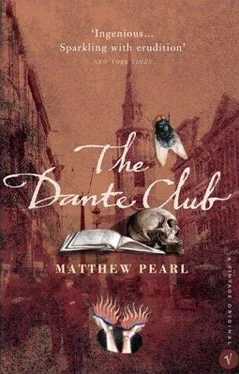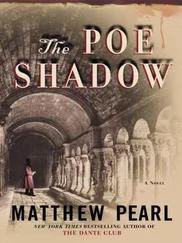“Doctor,” Teal said to him when they met in the slave tunnels. “Turn around now, Dr. Holmes. I was coming to see you.”
Holmes turned so his back was facing the uniformed soldier. The muted blaze from the doctor’s lantern shakily lit the long channel of the rocky abyss ahead.
“I guess your finding me is Fate,” added Teal, and then ordered the doctor forward.
“Dear God, man,” Holmes wheezed. “Where are we going?”
“To Longfellow.”
Holmes walked. Though his view of the man had been brief, he knew him at once as Teal, one of the night creatures, as Fields called them, from the Corner: their Lucifer. Now he noticed, looking back, that the man’s neck was as muscular as a prizefighter’s, but his pale green eyes and almost feminine mouth seemed incongruously childlike and his feet, probably a result of hard marches, supported his body with the eager perpendicular posture of an adolescent. Teal—this mere boy—was their enemy and opposite. Dan Teal. Dan Teal ! Oh, how could a wordsmith like Oliver Wendell Holmes have missed that brilliant stroke? DANTEAL…DANTE AL…! And, oh, what a hollow sound was the memory of Lowell’s booming voice at the Corner when Holmes had run into the killer in the hallway: “Holmes, you have betrayed the Dante Club!” Teal had been listening in, as he must have done at the Harvard offices too. With all the vengeance stored up by Dante.
If Holmes was slated for final judgment now, he would not bring Longfellow and the others into it. He stopped as the tunnel sloped downhill.
“I’ll go no farther!” he announced, trying to shield himself with an artificially bold voice. “I shall do what you ask of me but will not involve Longfellow!”
Teal responded with a flat, sympathetic silence. “Two of your men must be punished. You must make Longfellow understand, Dr. Holmes.”
Holmes realized that Teal did not want to punish him as a Traitor. Teal had come to the conclusion that the Dante Club was not on his side, that they had abandoned his cause. If Holmes was a traitor to the Dante Club, as Lowell had unwittingly announced to Teal, Holmes was friend to the real Dante Club: the one that Teal had invented in his mind—a silent association dedicated to carrying through Dante’s punishments into Boston.
Holmes took out his handkerchief and brought it to his brow.
At the same moment, Teal latched a strong hand on to Holmes’s elbow.
Holmes, against his own expectations, without forethought or plan, hurled Teal’s hand away with such force that Teal was knocked into the rocky cavern wall. Then the little doctor launched into a flying run, gripping his lantern with both hands.
With laboring breath he scurried through the dark and winding tunnels, glancing behind him and hearing all kinds of noises, but there was no way to determine what came from inside his head and his heaving chest and what existed outside himself. His asthma was a chain attached to a ghost’s leg, dragging him back. When he came upon some sort of underground cavity, he threw himself inside. There, he found an army-issue fur-lined sleeping bag and some scraps of a hard substance. Holmes cracked it with his teeth. Hard bread, the kind the soldiers had been forced to live on during the war: This was Teal’s home. There was a fireplace made from sticks, and plates and a frying pan and a tin cup and a coffee boiler. Holmes was about to run off when he heard a rustle that made him jump. Raising his lantern, Holmes could see that farther back in the chamber, Lowell and Fields sat on the floor, their hands and legs tied, gags in their mouths. Lowell’s beard slumped down into his chest and he was perfectly still.
Holmes tore the gags from his friends’ mouths and tried to unsuccessfully untie their hands.
“Are you hurt?” Holmes said. “Lowell!” He shook Lowell’s shoulders.
“He knocked us cold and brought us here,” Fields replied. “Lowell was cursing and shouting at Teal when he was tying us up here—I told him to shut his blasted mouth!—and Teal knocked him out again. He’s just unconscious,” Fields added prayerfully. “Isn’t he?”
“What did Teal want from you?” Holmes asked.
“Nothing! I don’t know why we’re alive or what he’s doing!”
“That monster has something planned for Longfellow!”
“I hear him coming!” Fields cried. “Hurry, Holmes!”
Holmes’s hands were trembling and dripping in sweat, and the knots were tied tight. He could barely see.
“No, go. You must go now!” Fields said.
“But another second…” His fingers slipped again from Fields’s wrist.
“It’ll be too late, Wendell,” Fields said. “He’ll be here. There’s no time to free us, and we wouldn’t be able to get Lowell anywhere like this. Get to Craigie House! Forget us now—you must save Longfellow!”
“I can’t do this alone! Where’s Rey?” Holmes cried.
Fields shook his head. “He never came, and all the patrolmen stationed at the houses are gone! They’ve been taken away! Longfellow’s alone! Go!”
Holmes dived out of the chamber, running through the tunnels faster than he had ever run, until ahead he saw a distant spark of silver light. Then Fields’s command grew in his mind: GO GO GO.
A detective unhurriedly descended the dank stairs to the basement of the Central Station. Groans and harsh curses could be heard through the bricked-up halls.
Nicholas Rey jumped up from the hard floor of the cell. “You can’t do this! Innocent people are in danger, for God’s sake!”
The detective shrugged. “You really do believe everything you dream up, don’t you, moke?”
“Keep me in here if you like. But put those patrolmen back at those houses, please. I beg you. There is someone out there who will kill again. You know Burndy didn’t murder Healey and the others! The murderer’s still out there, and he’s waiting to do it again! You can stop him!”
The detective looked interested in letting Rey try to persuade him. He tipped his head in thought. “I know Willard Burndy’s a thief and a liar, that’s what I know.”
“Listen to me, please.”
The detective gripped two bars and glared at Rey. “Peaslee warned us to keep an eye on you, that you wouldn’t mind your business, that you wouldn’t stay out of the way. I bet you hate being locked up with no way to do anything, nobody to help.”
The detective took out his ring of keys and waved it with a smile. “Well, this day’ll be a lesson to you. Won’t it, moke?”
Henry Wadsworth Longfellow emitted a series of short, barely audible sighs as he stood at his writing desk in his study.
Annie Allegra had suggested any number of games they could play. But the only thing he could do was to stand at his desk with some Dante cantos and translate and translate, to lay down his burden and cross through that cathedral door. In there, the noises of the world retreated and became an indistinguishable roar and the words lived in eternal vitality. There, in the long aisles, the translator saw his Poet in the stretch of gloom and he strove to keep pace. The Poet’s step is quiet and solemn. He is clothed in a long, flowing garment, and upon his head he wears a cap; on his feet are sandals. Through congregations of the dead, through hovering echoes flying from tomb to tomb, through lamentations below, Longfellow could hear the voice of the one who drove the Poet onward. She stood before them both, in the unapproachable, coaxing distance, an image, a projection with snow-white veil, garments as scarlet as any fire, and Longfellow felt the ice on the Poet’s heart melt as the snow does on mountain heights: the Poet, who seeks the perfect pardon of perfect peace.
Читать дальше












